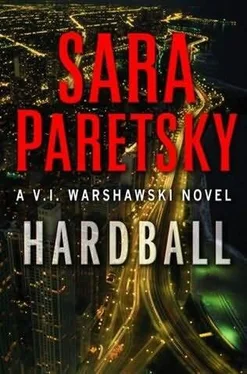The slow ride to South Chicago was like a backward journey through my life, the ride I’d taken with my mother so many times as a child, past the University of Chicago, where my mother had wanted me to study. “The best, Victoria. You need to have the best,” she would say when the train stopped there to let off students.
Ninety-first Street. End of the line. A certain desolation attached to the conductor’s announcement. Life ends here. I walked the four blocks from the station to my old home.
At least Señora Andarra’s grandson and his friends weren’t visible this morning, but a couple of helpless-looking men were sitting on a curb with a bottle in a brown paper bag. Somewhere, a car stereo was pouring out a bass so loudly that the air was vibrating from it.
At my old home, I saw the boarded-over window that had been broken to throw in the smoke bomb. The prisms across the top were splintered, too. I concentrated instead on the decorative-glass fanlight over the front door, which was still intact.
I rang the bell. After a few minutes, when I wondered if she’d gone out, Señora Andarra opened it the length of its stubby chain. “Esta ventana,” I stumbled in my bad Spanish, pointing at the fan. “Mi madre amó esta ventana también.”
The fact that my mother also loved that window didn’t make Señora Andarra smile, but it did keep her from slamming the door in my face. Using painful pidgin Spanish interlaced with English and Italian, I tried to explain that I was a detective, that I had photographs. Could she look at them, let me know if any of the people in them had been at her house when the bomb came through the window?
The whole time I spoke, she stared at me through the crack in the door, her dark eyes frowning in her nut-colored face. When I finally stumbled to an end of my story, she took the folder from me. As I’d feared, she singled Petra out with no trouble.
“¿Su hija?” she asked.
I was tired of everyone thinking Petra was my daughter, so I dutifully explained she was my cousin. “Mi prima. ¿Y los hombres?”
I thought she lingered on the shot of Alito with Strangwell, but I couldn’t be sure. She finally shook her head, and said she didn’t know any of them, hadn’t seen any of them. I walked back to the station and waited for the northbound train to whisk me back to civilization, or whatever it was.
THE BOYS IN THE BACK ROOM
ON THE TRAIN NORTH, I CALLED CONRAD RAWLINGS AT the Fourth District. Of course, I should have gone to see him before visiting Señora Andarra, but I didn’t feel I had spare time for getting police permission to talk to people in my cousin’s orbit.
Conrad was predictably annoyed, but he’d seen the news about Petra; he was more interested in finding out why she’d been at a crime scene in his bailiwick than yainching at me for not calling him first.
“Is there anyone else you can place at the crime scene that you might care to mention? Not that we cops can compel testimony. The laws keep us from getting answers to questions that might help solve crimes. But if you’re in the mood…”
I ignored the savagery in his tone. “I showed Ms. Andarra a shot of Larry Alito with Les Strangwell, but they didn’t look familiar to her.”
“Spell the names.”
I could hear him tapping at his computer.
“Any special reason you think a cop and a politico-a big Gorgon zola politico, from what Google is telling me-would be involved in a two-bit home invasion?”
“Alito’s an ex-cop, and he’s sniffing around this story somewhere, somehow. Strangwell is my cousin’s boss at the Krumas campaign.”
“And that’s reason enough to suspect he’s a villain, because anyone who tries to boss the Warshawski women around must be a criminal?”
“I can’t talk about this now. Not with you hostile and me out of my head with worry.” I pressed the OFF button.
A detective who’s out of her head with worry is useless. I slipped off my shoes and pulled my feet up to sit cross-legged on the seat. Took deep, low breaths, tried to empty my mind of fear, to fill it with a useful to-do list.
The police and FBI had both canvassed the street where I have my office, to see if anyone could describe the men who’d been with Petra, or at least the car they’d driven-if they’d come by car. Naturally, they wouldn’t share the results with me. I didn’t want to retrace all those steps, not on my own: there must be several hundred people in that section of Milwaukee, between the businesses and the apartments. But I could talk to Elton Grainger. I couldn’t remember whether I’d seen him yesterday or not. He was usually at the coffee bar across the street during the day. If he hadn’t been too drunk, he might remember seeing Petra with her entourage.
Petra’s college roommate, Kelsey Ingalls. My aunt wouldn’t give me her phone number, but Kelsey was the person Petra might have confided in. I could surely find her in one of my subscription databases.
Those two tasks meant I should go to my office, but when the train pulled into the Randolph Street station I realized I was underneath the building where the Krumas campaign had its headquarters. Maybe Petra had confided in one of her coworkers. Maybe Les Strangwell would tell me what she’d been working on. What was it Johnny’s daughter had said? Enough “maybes” make a hive.
I went through the maze of underground corridors and found my hat where I’d left it, stuffed behind the potted palm: not a good mark for the cleaning staff but easier for me. I put the Cubs hat and CHICAGO sweatshirt in my briefcase. I kept forgetting the Nellie Fox baseball. It was in there, too. My case now bulged so much with discarded clothes that I couldn’t zip it shut.
I checked in with the lobby guard, who phoned up to the campaign. She did a creditable job with my name, Petra having probably accustomed her to it. The guard looked at my passport, printed out a pass, and directed me to the elevators that would carry me to 41.
When I got off the elevator, I barely had time to admire the giant red-white-and-blue posters with Brian’s bright smile and keen eyes. A thirty-something woman, with a mass of reddish curls, hurried through the double glass doors to greet me. She was carelessly dressed in a yellow shirt whose tails partly hung out over a floral-print skirt, and she started speaking almost before she was through the doors.
“Where have… Oh! Who are you?” Her hands, which she’d been brandishing in annoyance, fell loosely at her sides.
“V. I. Warshawski… Who are you?”
“Oh! Petra’s cousin, the detective. Petra forgets her ID about once a week, and the front desk has to call for permission to let her in. I was hoping this meant she’d shown up. Where is she?”
“I wish I knew. I want to find out what she’s been working on to see if it’ll give me any hint about where she might have gone.”
The woman glanced uncertainly at the double glass doors. “Maybe I’d better ask Mr. Strangwell. She’s been doing more for him lately than for me.”
“You’re…” I squeezed my eyes shut, trying to remember if Petra had ever called her boss by name.
“Tania Crandon. I run the NetSquad, which is where Petra started. Before she got so important that she only takes orders from Mr. Strangwell.” When she realized how resentful she sounded, the skin at her throat and chest flushed in the blotchy way that afflicts very fair people.
She was wearing an ID around her neck, which she swiped against a pad on the doors. When they clicked open, I followed her into the campaign hive. Her cellphone tweeted to let her know she had messages coming in. She glanced at these and thumbed responses as we walked past campaign workers. They were gathered in knots over computer screens, arguing in corners, answering cellphones and landlines, shrieking news at each other across the tops of cubicles.
Читать дальше












